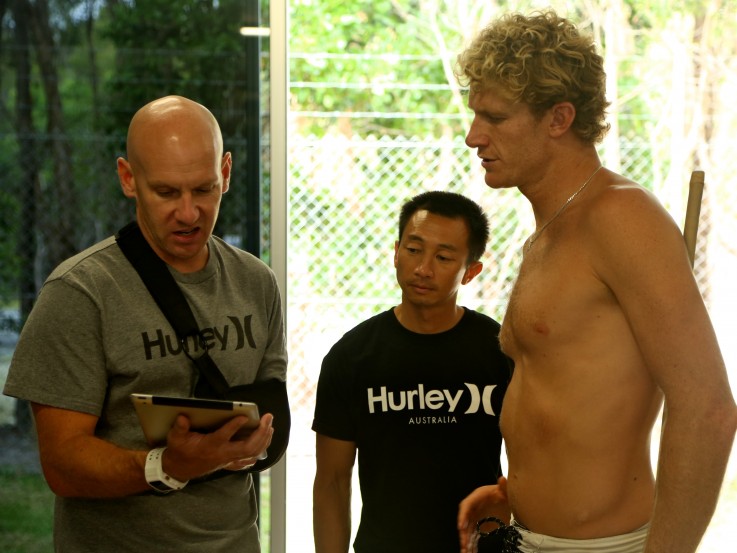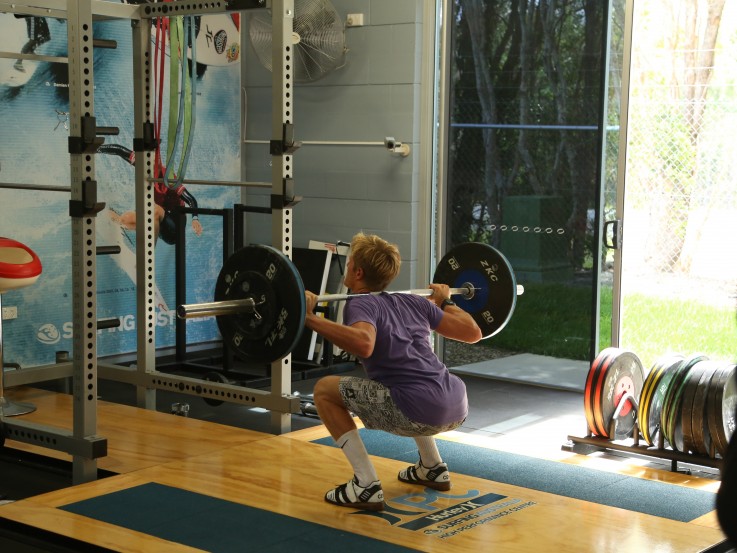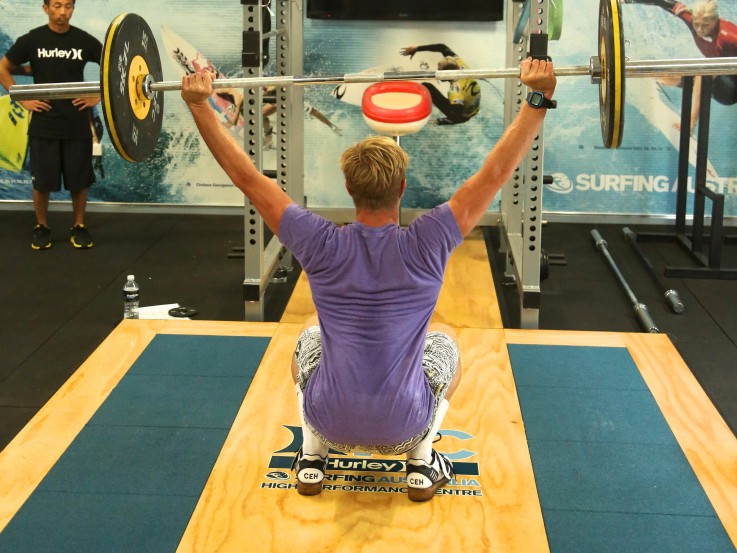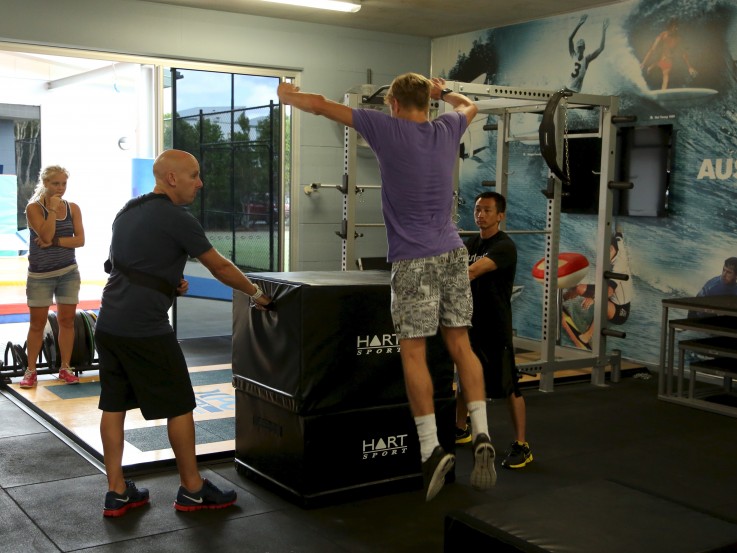Jeremy Sheppard - Surfing Australia
When did you start surfing and get your first board?
I first started surfing in 1994 on Vancouver Island in Canada. I grew up in the middle of Canada playing ice hockey and about 3 or 4 other sports as well, but those didn’t pan out. I’d always wanted to surf so I just chased it.
I’m assuming the water was pretty cool?
Yeah, my first surf was in 10 to 11 degree water. Since then I’ve surfed 4 degree water with 0 degree air temperature.
Why did you choose surfing?
It’s an odd story, I had my head set on being an Ice Hockey player, because that’s what men do where I’m from. But I had a lot of knee injuries and ice hockey is a big mans game, and me being only 5’8” I got a bit bashed up. Everyone dreams of a pro career and when that doesn’t work out you have all this time on your hands and need to find something to do with yourself. This sounds really corny, but I watched this movie late one night called the North Shore, and I knew it was corny at the time, but didn’t really care because the guys in it were nuts! It kind of struck a chord with me, that whole ‘do it my way’ rebellious attitude that a lot of surfers have. That’s why you find that a lot of the professional surfers were great athletes in more traditional sports growing up, but chose surfing because they didn’t want to be at the swimming pool at 5 am in the morning, or didn’t want to play Rugby League, so they chose surfing for that freedom and the lifestyle that allowed for it.
So once you started surfing was that it? Were you hooked?
I had to finish uni which was a bit gut wrenching, I moved up to Vancouver island, back then there was no such thing as surf coaching in that area, so I was on the wrong board, doing all the wrong things and picking up all the bad habits. So surfing was basically a summertime fling between going to Uni until I finished the degree. But when I finished I started shaping all my career aspirations around surfing.
Did you do much surf travel? Or did you go straight into work?
I moved around and experienced the world a bit, and I’m really fortunate that I got to combine surfing and work. I was in California for a while then came to Australia where I’ve done my Masters and PhD, and situated myself where I could get higher education but also surf and experience the country at the same time. I’ve been around Europe, South East Asia, Central and South America, it’s been good. I had to work hard to make it work though.
Do you have a favourite surf spot?
I live in Cabarita beach. A lot of people will tell you that you can’t list Caba! But I find that at my age there’s more to it than just good surf, I enjoy riding my bike to the beach etc, and to me it just feels like the ultimate free lifestyle. So that is probably my favourite place. Or if I’m up for a drive, North Stradbroke.
Can you tell us a little bit about your education?
I studied a human movement degree as an undergraduate and I took a great emphasis on coaching and how to articulate and manage athletes. I took a few minors in Aboriginal studies because I’m interested in the people of the world, and also organizational psychology because I definitely found that playing team sports growing up you can have really talented athletes that are not productive members of the team. So I thought that in life it would be an important skill to know how to manage dysfunctional athletes etc. I then did a postgraduate diploma in Elite Athlete development through the coaching institute of Canada.
Even though Canada isn’t at the forefront of everyone’s mind when it comes to excelling in an array of sports, in terms of coaching, they are front-runners. A lot of countries copy the Canadian approach to coaching. It was a great program, it basically worked around being a resident coach there for a year where you are assigned a mentor and you take classes with all these coaches from other sports, which was really cool. After that I did a Masters degree in Australia, then my PhD. The Masters was in Sports Science really focusing on speed and agility and perception and decision making in athletes, and testing and profiling athletes to that end. My PhD ended up being a long series of studies on lower body neuromuscular characteristics where I focused a lot on Volleyball. At the time I was working with the National Volleyball team through the Australian Institute of Sport and I found that the studies I undertook still benefit me in every other sport I have worked with from swimming to surfing.
What was your first job?
My first job ever was at 12 years old back in Canada throwing hay bales on to trucks because my dad thought all the farm boys were really strong in the pre-season for ice hockey, so thought that’s how it came about. Then my first job in terms of moving towards where I am today, I was 18 years old working with an under 16’s ice hockey team just doing all their physical preparation. I just kept growing each year, worked with basketball and other sports, I guess because I came from a working-class family my parents taught me a lot about work ethic, I guess you can say I’m lucky, but I was really stubborn. It’s a tough career path because it doesn’t really have a clear direction and it’s hard to get into, so back then I just stubbornly just kept pursuing it, there wasn’t much money in it for years.
How did you navigate through your career from one job to the next?
Very early, I was just trying to climb the ladder and work with better athletes to get more of a reputation. A colleague of mine would call it ‘building a body of work’. You need to build this body of work that gives confidence in athletes you’re working with, and to administrators who hire you. You need to be confident but not arrogant and build this body of work where you no longer look for opportunities, but they come to you. That started to happen after about 10 years of really hard work and diligence in building that body of work. At first the opportunities are all good, so you take them all, and now at this stage of my career it’s about working in the sport I want to work with and with the people I want to work with. When I’m mentoring young coaches I talk to them about the 3 p’s – What is the professional scope, who are the personalities involved, and what is the pathway. This helps you decide if it’s a good opportunity for you. So in surfing I work for an organization that’s going places with personalities I want to work with. The professional scope involves the opportunity for me to implement changes that will enhance the sport, and the pathway is that I get to follow it through long term.
What is your job, and what does it involve on a day-to-day basis?
I’m the Head of Strength and Conditioning and Sports Science Manager at Surfing Australia. It’s what you might call a Performance Director in other sports. I always remind the organization and myself that the most important thing for me to do is to train elite surfers in regards to their strength and conditioning and nutrition. The most important relationship I have is with our national coach Andy King. We speak at least once a day regarding performance issues. It’s very much a team approach in that what I do can enhance or undo what he is trying to accomplish in the water. Obviously you don’t win world titles in a weight room, you may earn them there, but I need to make sure that the training is relevant to the aspects of their performance that will allow them to win, so working with the surf coach is paramount.
Do you work with elite athletes alone, or the up and coming young talent as well?
I work with the Elite athletes specifically. Our scholarship program needs a pathway, so that’s our national development program that is essentially working with kids. I’m not as hands on with that, but as a performance director I have a big role in getting the right information to those kids. A 12 or 13 year old kid doesn’t need the volume of training that the elite’s do, what they need is guidance and support. That program is like an investment, for the future. If we only work with the elite, when they retire, the next generation is going to come through asking ‘where were you when I really needed you?’ and we’re going to look at them thinking ‘I really wish I could fix those technical problems’. But if that 12 year old who’s training downstairs right now has problems when he’s 18, it’s all our fault. We’ve invested in him because we feel he’s very talented, which we’re going to nurture, and if he enjoys that through his teens, and loves what he is doing with us, then that relationship is strong, so at 18 he will be precisely what we expect to see physically and technically. There are about 20 athletes I will be working with in 2014 that are WCT or other levels that we feel have the criteria to make it as a professional. This is our responsibility to the Australian Institute of Sport, who funds high performance programs. I am elitist, I don’t know how to work with the average person because I’m not qualified. I’m uniquely qualified to work with elite athletes. It doesn’t take anything away from the recreational surfing community and their importance, it purely means that I am paid by Surfing Australia, with AIS funding, to work with the sport and the athletes competing at an elite level.
What do you love most about your job?
The people I work with and the relationships with the athletes. I love getting in there with them and coaching. I love coaching. It’s about solving problems. People always introduce me as ‘Doctor’ and as the Sports Science Manager, but that education background was all to allow me to become a better coach. It’s all about problem solving. Even when we do these complicated research projects, it all comes down to one simple problem that we’re trying to solve simply. If we solve it in the most complicated way we wont be able to do anything. We need to have an actionable outcome that is simple enough to implement repeatedly. It’s those things that you constantly repeat, and do repeatedly well, that add up to a world title. Sophisticated training is not about being complicated, it can be doing the simplest things very well.
Is this your dream job?
I go to a lot of conferences where it always comes up. Short answer - Yes, I do have my dream job based on what I value. I’m from a small town. A boring backwater, vanilla town. I am literally a redneck by nature and nurture! I now live in a beach side town that is very multicultural, where I get to participate in the sport I love almost every day. It’s not a dream job because I get to work with surfers; it’s more for the fact that I am presented with their problems. They travel a lot, it’s so novel for me that 80% of the time a surfer gets on a plane it is without me. That’s not normal for elite athletes in Olympic sports; they take their guys everywhere. So that presents me with a unique problem that pushes me and challenges me. Helping athletes do better aerials, without injury, is a fun problem to work with. Getting them really strong, mobile, and gymnastic, these are very fun problems to work with. It’s not a dream job because I’m obsessed with competitive surfing, I’m not even in a board riders club, so it’s not because I’m working with them. It’s because working in competitive surfing provides me with a lifestyle that my wife, my son and myself enjoy, the workplace is amazing, the organization is so supportive, and I love solving the problems they bring me. I wake up every day wanting to work. I love it.
Where can we find you online?
| Web: | www.surfingaustralia.com |
| Instagram: | instagram.com/surfingaus |
| Facebook: | www.facebook.com/surfingaustraliainc |
| Twitter: | twitter.com/surfingaus |
Posted by: Troy Roennfeldt, on November 27, 2013
Categories: Interviews
Latest Posts
Craig Sims - White Horses & Surfing Life Publisher
Luke Kennedy - Editor of Tracks Magazine
Simon ‘Swilly’ Williams - Surf Photographer
Jarra Campbell - the Bondi Alchemist
Greg Gordon - Owner of CR Surf
Shayne Nienaber - Surf Photographer
Alexa Hohenberg - Owner of Still Stoked
Christine Deveney - TapaReef Owner & Creator
Russell Ord - Surf Photographer
Richard Kotch - Surf Photographer
Categories
Interviews
Articles
Videos
Press Releases
Quiz
Archive
December 2018
November 2018
October 2018
September 2018
August 2018
July 2018
June 2018
May 2018
April 2018
March 2018
February 2018
January 2018
November 2017
January 2017
December 2016
November 2016
October 2016
September 2016
August 2016
July 2016
June 2016
May 2016
April 2016
March 2016
February 2016
January 2016
December 2015
November 2015
October 2015
September 2015
August 2015
July 2015
June 2015
May 2015
April 2015
March 2015
February 2015
January 2015
December 2014
November 2014
October 2014
September 2014
August 2014
July 2014
June 2014
May 2014
April 2014
March 2014
February 2014
January 2014
December 2013
November 2013
October 2013
September 2013
August 2013
July 2013
June 2013
May 2013
April 2013
March 2013












